Political leaders often boast of inner steel. Imran Khan can point to three bullets dug out of his right leg. It was in November that a lone gunman opened fire on Khan during a rally, wounding the 70-year-old as well as several supporters, one fatally. “One bullet damaged a nerve so my foot is still recovering,” says the former Pakistani Prime Minister and onetime cricket icon. “I have a problem walking for too long.”
More from TIME
If the wound has slowed Khan, he doesn’t show it in a late-March Zoom interview. There is the same bushy mane, the easy laugh, prayer beads wrapped nonchalantly around his left wrist. But in the five years since our last conversation, something has changed. Power—or perhaps its forfeiture—has left its imprint. Following his ouster in a parliamentary no-confidence vote in April 2022, Khan has mobilized his diehard support base in a “jihad,” as he puts it, to demand snap elections, claiming he was unfairly toppled by a U.S.-sponsored plot. (The State Department has denied the allegations.)
The actual intrigue is purely Pakistani. Khan lost the backing of the country’s all-powerful military after he refused to endorse its choice to lead Pakistan’s intelligence services, known as ISI, because of his close relationship with the incumbent. When Khan belatedly greenlighted the new chief, the opposition sensed weakness and pounced with the no-confidence vote. Khan then took his outrage to the streets, with rallies crisscrossing the nation for months.
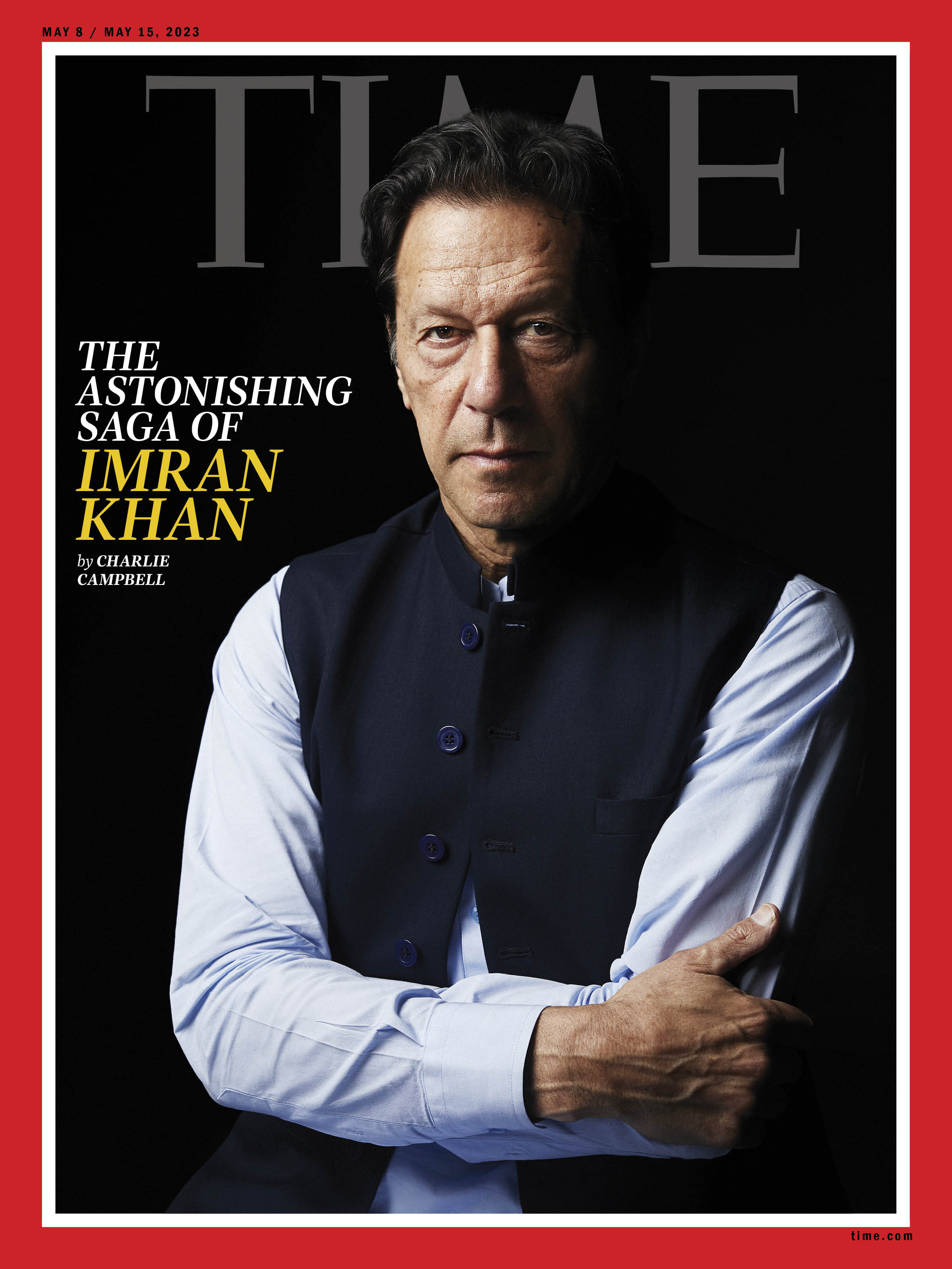
Buy a print of the Imran Khan cover here
“Imran Khan can communicate with all strata of society on their level,” says Shaheena Bhatti, 63, a professor of literature in Rawalpindi. “The other politicians are … not going to do anything for the country because they’re only in it for themselves.”
The November attack on Khan’s life only intensified the burning sense of injustice in members of his Pakistan Tehreek-e-Insaf party, or PTI, who have since clashed with police in escalating street battles involving slingshots and tear gas. Although an avowed religious fanatic was arrested for the shooting, Khan continues to accuse an assortment of rival politicians of pulling the strings: incumbent Prime Minister Shehbaz Sharif—brother of Khan’s longtime nemesis, former Prime Minister Nawaz Sharif—as well as Interior Minister Rana Sanaullah and Major General Faisal Naseer. (All have denied the accusation.)
In addition to bullets, Khan has also been hit by charges—143 over the past 11 months, by his count, including corruption, sedition, blasphemy, and terrorism—which he claims have been concocted in an attempt to disqualify him from politics. After Sharif’s cabinet declared on March 20 that the PTI was “a gang of militants” whose “enmity against the state” could not be tolerated, police arrested hundreds of Khan supporters in raids.
“Either Imran Khan exists or we do,” Interior Minister Sanaullah said on March 26.
Read More: The Attempt to Arrest Former Pakistan Leader Imran Khan Has Been Paused
Pakistan sometimes seems to reside on a precipice. Its current political instability comes amid devastating floods, runaway inflation, and resurgent cross-border terrorist attacks from neighboring Afghanistan that together threaten the fabric of the nation of 230 million. It’s a country where rape and corruption are rife, and the economy hinges on unlocking a stalled IMF bailout, Pakistan’s 22nd since independence in 1947. Inflation soared in March to 47% year-over-year; the prices of staples such as onions rose by 228%, wheat by 120%, and cooking gas by 108%. Over the same period, the rupee has plummeted by 54%.
“Ten years ago, I earned 10,000 rupees a month [$100] and I wasn’t distressed,” says Muhammad Ghazanfer, a groundsman and gardener in Rawalpindi. “With this present wave of inflation, even though I now earn 25,000 [$90 today] I can’t make ends meet.” The world’s fifth most populous country has only $4.6 billion in foreign reserves—$20 per citizen. “If they default, and they can’t get oil, companies go bust, and people don’t have jobs, you would say this is a country ripe for a Bolshevik revolution,” says Cameron Munter, a former U.S. ambassador to Pakistan.
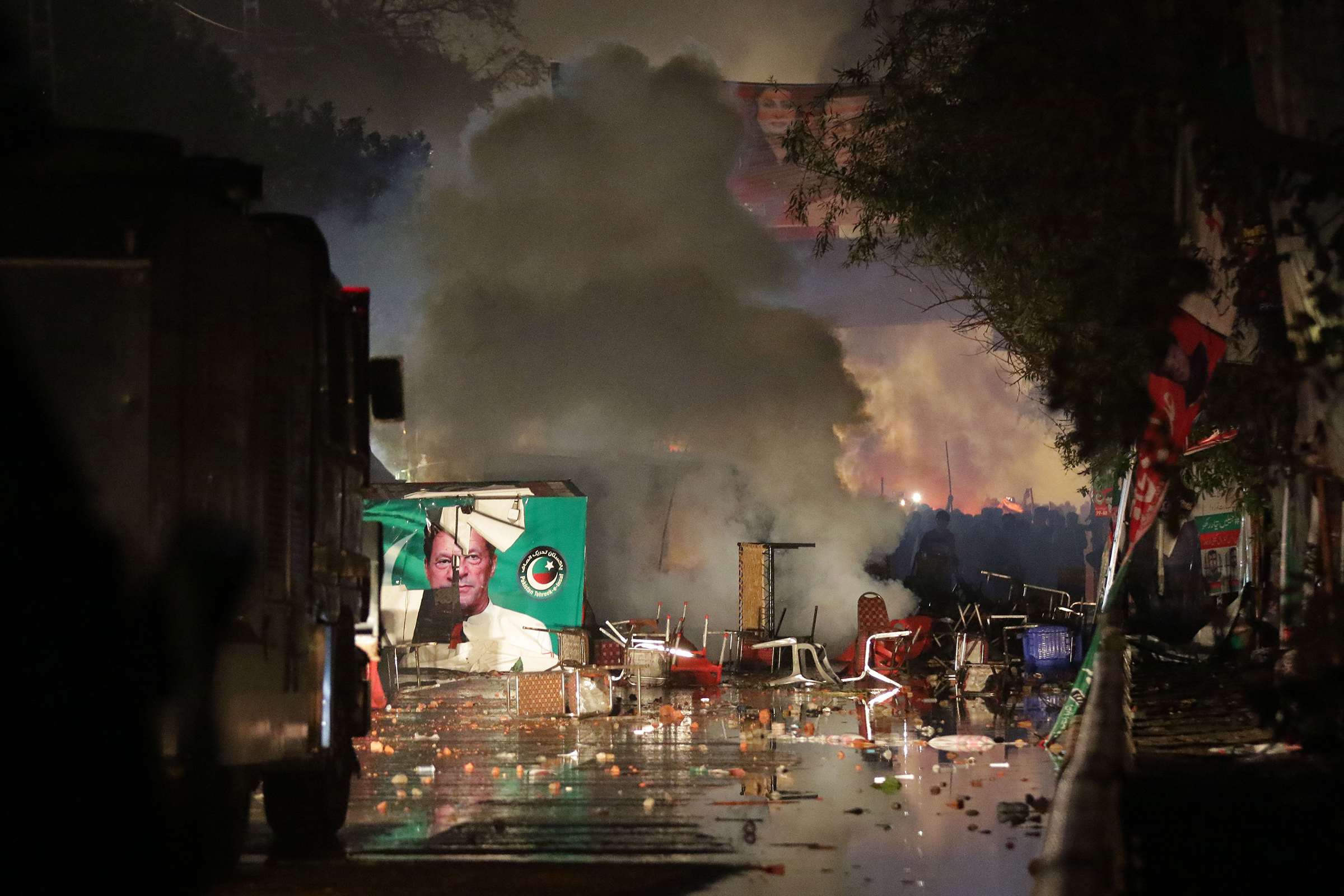
“Our economy has gone into a tailspin,” says Khan. “We now have the worst economic indicators in our history.” The situation threatens to send the nuclear-armed country deeper into China’s orbit. Yet sympathy is slim in a West put off by Khan’s years of anti-American bluster and cozying up to autocrats and extremists, including the Taliban. He calls autocratic Turkish President Recep Tayyip Erdogan “my brother” and visited Russian President Vladimir Putin in Moscow on the eve of the Ukraine invasion, remarking on “so much excitement.” Khan can both repeatedly declare Osama bin Laden a “martyr” and praise Beijing’s confinement of China’s Uighur Muslim minority. He has obsessed on Joe Biden’s failure to call him after entering the White House. “He’s someone that is imbued with this incredibly strong sense of grievance,” says Michael Kugelman, the deputy director of the Asia Program at the Woodrow Wilson Center.
Yet Khan can legitimately claim to have democracy on his side, with poll numbers suggesting he is a shoo-in to return to power if the elections he demands happen. “His popularity has skyrocketed,” says Samina Yasmeen, director of the Centre for Muslim States and Societies at the University of Western Australia. “No matter what he says, even if it’s irrational, the reality is that people are angry and taken by his message.”
“Imran Khan is the best bet we have right now,” says Osama Rehman, 50, a telecommunications engineer in Islamabad. “If [he] is arrested or disqualified, people will come out onto the street.”
The state appears to flirt with the idea. Police raids on Khan’s home in the Punjab province capital of Lahore in early March left him choking on tear gas, he says, as supporters brandishing sticks battled police in riot gear before makeshift barricades of sandbags and iron rods. “This sort of crackdown has never taken place in Pakistan,” says Khan. “I don’t know even if it was as bad under martial law.”
After Khan left his compound to appear in court on March 18, traveling in an armored SUV strewn with flower petals and flanked by bodyguards, the police swooped in while his wife was home, he says, beating up servants and hauling the family cook off to jail. He claims another assassination attempt awaited inside the Islamabad Judicial Complex, which was “taken over by the intelligence agencies and paramilitary.”
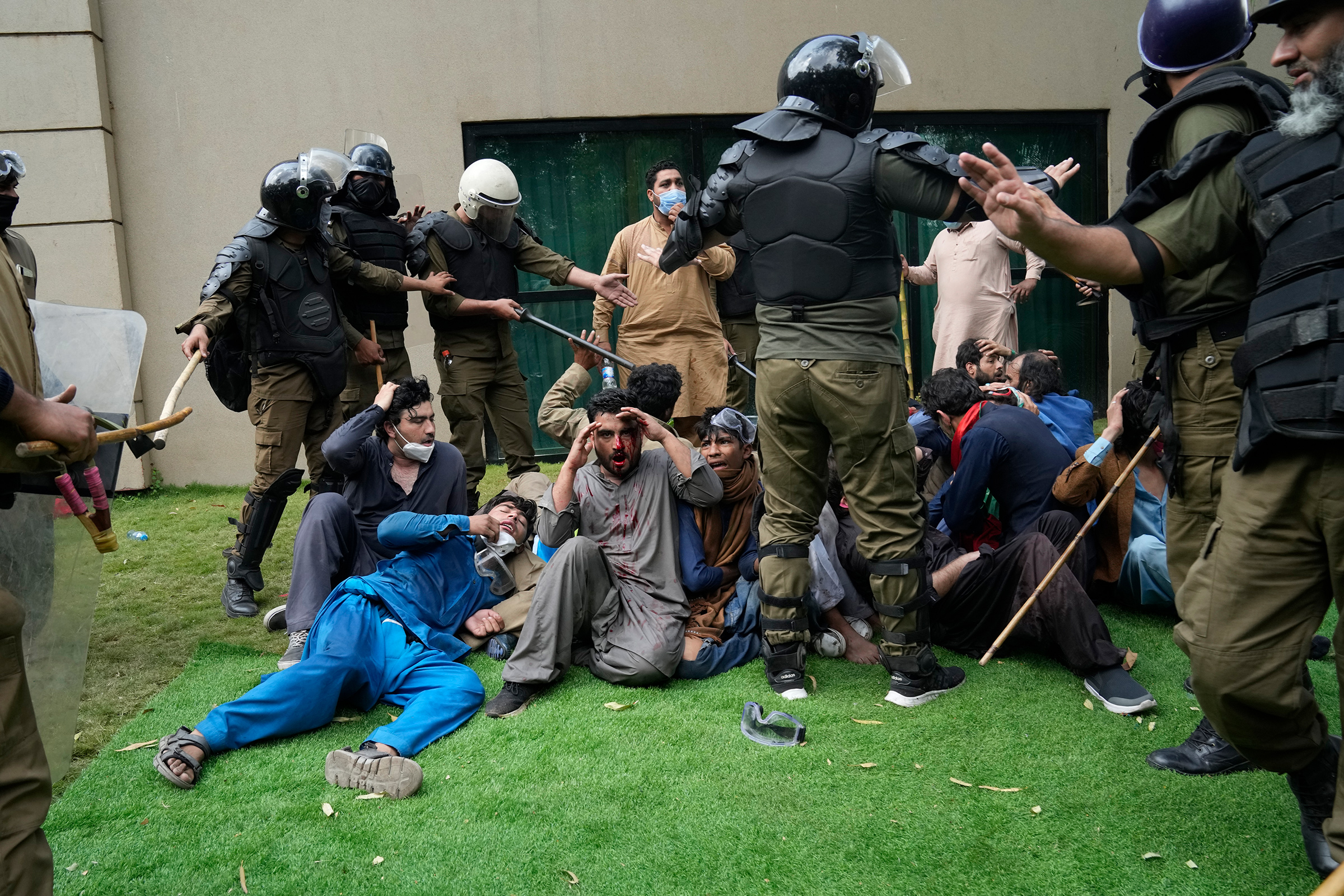
The confrontation could remain in the streets indefinitely. Prime Minister Sharif has rejected Khan’s demand for a snap election, saying polls would be held as scheduled in the fall. But “every narrative is being built up [for the government] to justify postponing the elections,” says Yasmeen. On March 22, Pakistan’s Election Commission delayed local balloting in Punjab, the country’s most populous province, from April 30 until Oct. 8.
“Political stability in Pakistan comes through elections,” Khan points out. “That is the starting point for economic recovery.” From the U.S. perspective, he may be far from the ideal choice to helm an impoverished, insurgency-racked Islamic state. But is he the only person that can hold the country together?
“Never has one man scared the establishment … as much as right now,” says Khan. “They worry about how to keep me out; the people how to get me back in.”
It’s indicative of Pakistan’s malaise that its most popular politician in decades sits barricaded at home. But the nation has always been beyond comparison—a wedge of South Asia that begins in the shimmering Arabian Gulf and ascends to its Himalayan heights. It’s the world’s largest Islamic state, though governed for half its history by men in olive-green uniforms, who continue to act as ultimate arbiters of power.
The only boy of five children, Khan was born Oct. 5, 1952 to an affluent Pashtun family in Lahore. He studied politics, philosophy, and economics at Oxford University, and it was in the U.K. that he first played cricket for Pakistan, at age 18. Britain’s sodden terrain also provided the backdrop to his political awakening.
“When I arrived in England our country had been ruled by a military dictator for 10 years; the powerful had one law, the others were basically not free human beings,” he says. “Rule of law actually liberates human beings, liberates potential. This was what I discovered.”
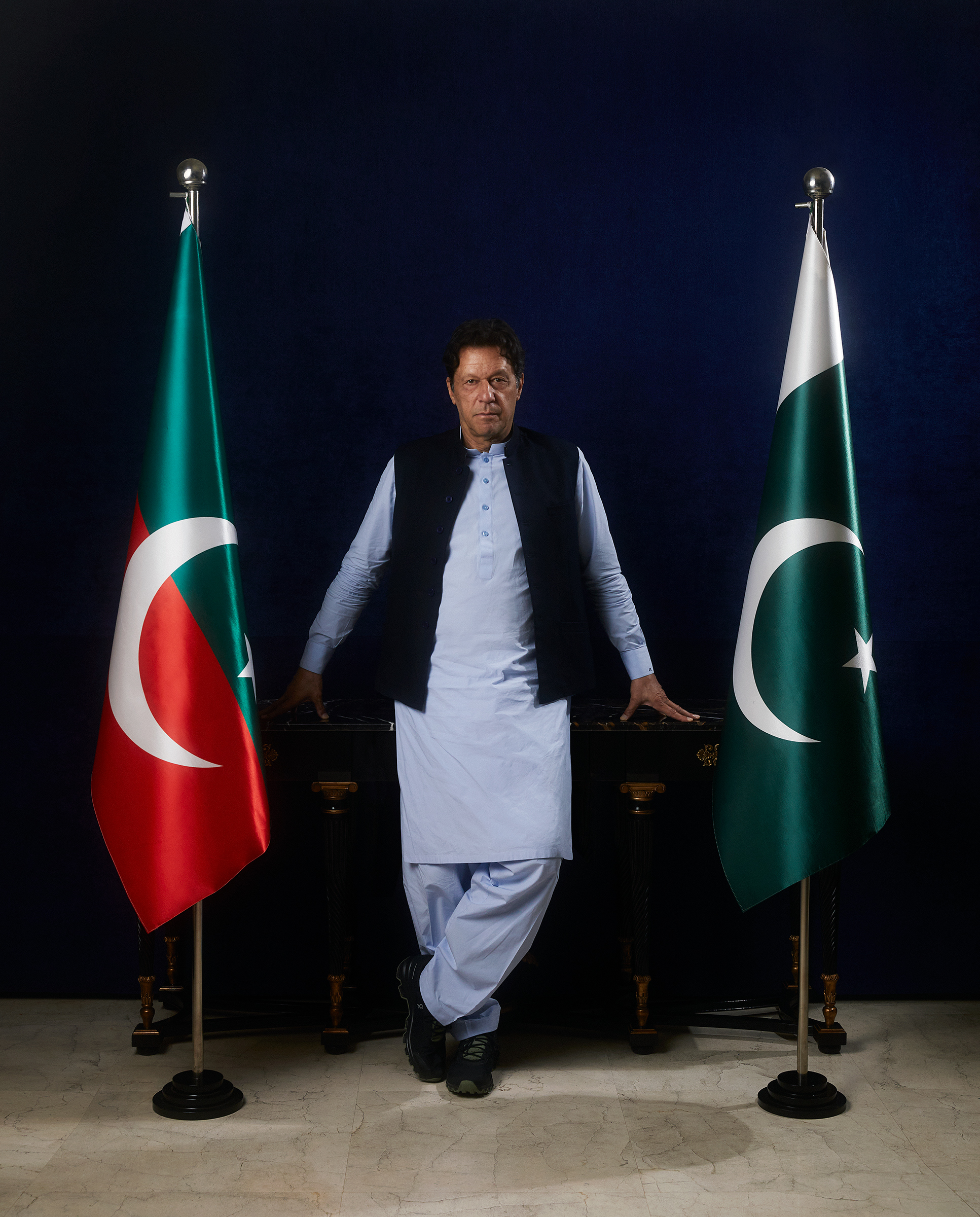
On the cricket pitch, Khan was a talisman who knitted together mercurial talents and journeymen into a cohesive whole, a team that overcame extraordinary odds to famously lift the Cricket World Cup in 1992. There were glimpses of these qualities when Khan rose to become Prime Minister: running on an anti-graft ticket, he fused a disparate band of students and workers, Islamic hard-liners, and the nation’s powerful military to derail the Sharif political juggernaut. His crowning achievement remains the Shaukat Khanum Cancer Hospital in Lahore, which he opened in 1994 in memory of his mother, who succumbed to the disease. It is the largest cancer hospital serving Pakistan’s impoverished, boosting Khan’s administrative credentials.
Khan spent 22 years in the political wilderness before his 2018 election triumph. But once in power, the self-styled bold reformer turned unnervingly divisive. Opposition is easier than government, and Khan found himself bereft of ideas and besieged by unsavory partners, even kowtowing to the now-banned far-right party Tehreek-e-Labbaik Pakistan despite its support for the extrajudicial killing of alleged blasphemers. There were some successes: Pakistan received praise for its handling of the pandemic, with deaths per capita just a third that of neighboring India. His “Ten Billion Tree Tsunami” reforestation drive was popular, as was the 2019 return of international test cricket, the most prestigious form of the game, following a terrorist attack on the Sri Lankan team and a decade-long hiatus.
Read More: Pakistan’s Poisonous Politics
Khan’s private life has rarely been out of the headlines. His first wife was British journalist and society heiress Jemima Khan, née Goldsmith, a close friend of Diana, Princess of Wales. She converted to Islam for their wedding, though the pair divorced in 2004 after nine years of marriage, and her family’s Jewish heritage was political dynamite. (The couple’s two sons live in London.) Khan’s second marriage to British-Pakistani journalist Reham Khan lasted nine months. According to a 1997 California court ruling, Khan also has one child, a daughter, born out of wedlock, and he’s struggled to quash gossip of several more. In 2018, six months before he took office, he married his current wife, Bushra Bibi Khan, a religious conservative who is believed to be the only Pakistan First Lady to wear the full-face niqab shawl in public.
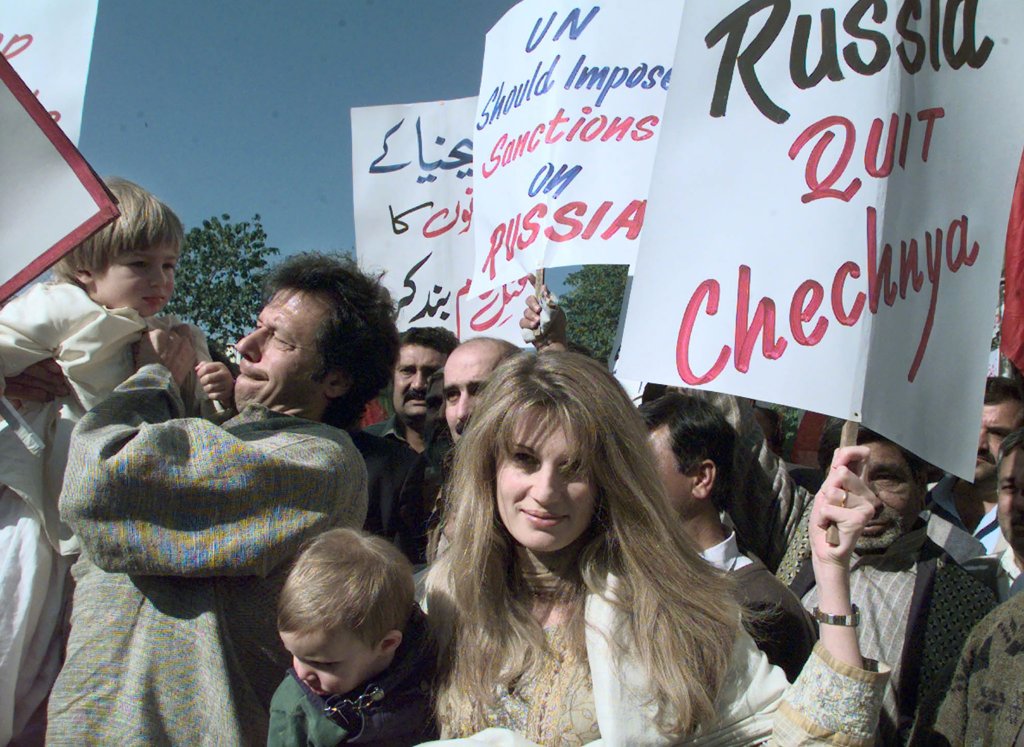
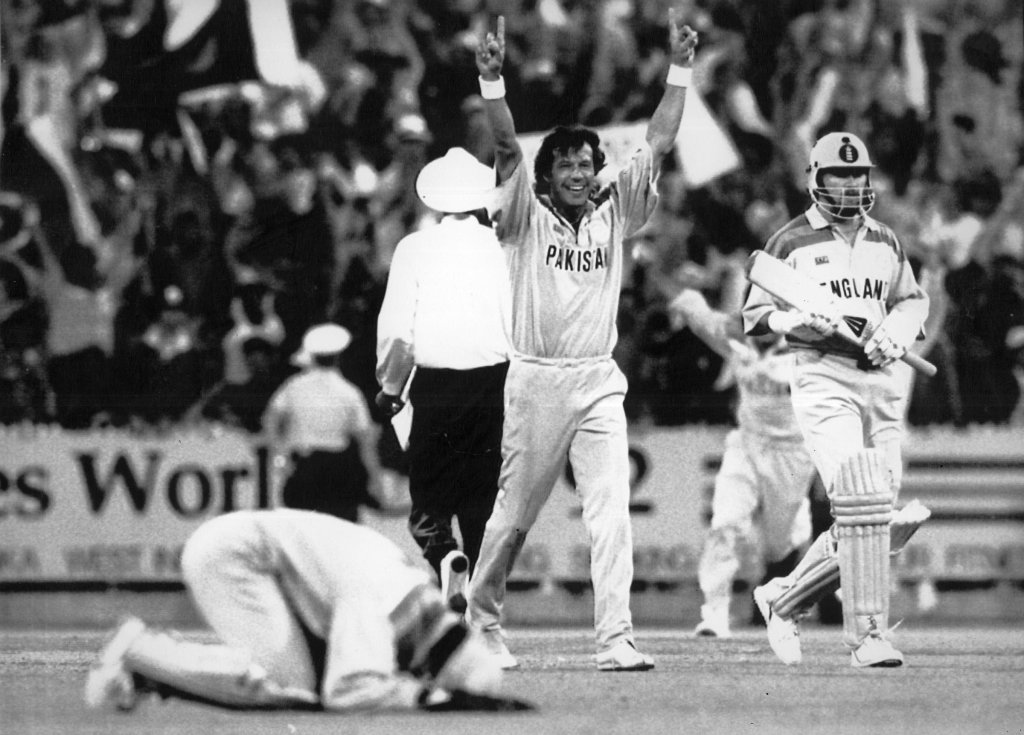
It all fed Khan’s legend: the debonair playboy who grew devout; the privileged son who rails against the corrupt; the humanist who stands with the bloodthirsty. His youth was spent carousing with supermodels in London’s trendiest nightspots. But his politics has hardened as his handsome features have lined and leathered. He provoked outrage when in August 2021 he said the Taliban had “broken the shackles of slavery” by taking back power (he insists to TIME he was “taken out of context”) and has made various comments criticized as misogynistic. When asked about the drivers of sexual violence in Pakistan, he said, “If a woman is wearing very few clothes, it will have an impact on the men, unless they’re robots.” Khan has refused to condemn Putin’s invasion, insisting, like China, on remaining “neutral” and deflecting uncomfortable questions onto supposed double standards regarding India’s inroads into disputed Kashmir. “Morality in foreign policy is reserved for powerful countries,” he says with a shrug.
At the same time, Khan’s ideological flexibility has not stretched to compromises with opponents. He claims it was the military’s unwillingness to go after Pakistan’s influential “two families”—those of Sharif and the Bhutto clan of former Prime Ministers Zulfikar and Benazir—for alleged corruption that caused his relationship with the generals to fray. “If the ruling elite plunders your country and siphons off money, and you cannot hold them accountable, then that means there is no rule of law,” he says.
Yet analysts say that it was Khan’s relentless taunting of the U.S. that torpedoed his relationship with the military, which remains much more interested in retaining good relations with Washington. To journalists and supporters, he has accused the U.S. of imposing a “master-slave” relationship on Pakistan and of using it like “tissue paper.” To TIME, he insists that “criticizing U.S. foreign policy does not make you anti-American.” Still, by 2022, the generals no longer had his back. The common perception among Pakistan watchers is that Khan’s fleeting political success was owed to a Faustian pact with the nation’s military and extremist groups that shepherded his election victory and he is now reaping the whirlwind.

He appears to relish in the perceived injustice, the walls closing in. On March 25, Khan addressed thousands of supporters in central Lahore from a bulletproof box above a green-and-red flag with the initials of his PTI emblazoned on a cricket bat—once Khan’s weapon of choice, though now he wields words with similar potency.
“I know you have decided you wouldn’t allow Imran Khan back in power,” he said. “That’s fine with me. But do you have a plan or know how to get the country out of the current crisis?”
If Pakistan’s economic woes are reaching a new nadir, the trajectory was established during Khan’s term. A revolving door of Finance Ministers was compounded by bowing to hardliners. (After appointing renowned Princeton economist Atif Mian as an adviser, Khan fired him just days later owing to a backlash from Islamists because Mian is an Ahmadi, a sect of Islam they consider heretics.) In 2018, Khan pledged not to follow previous administrations’ “begging bowl” tactics of foreign borrowing, in order to end Pakistan’s cycle of debt. But less than a year later, he struck a deal with the IMF to cut social and development spending while raising taxes in exchange for a $6 billion loan. Mismanagement exacerbated global headwinds from the pandemic and soaring oil prices.
Meanwhile, little was done to address Pakistan’s fundamental structural issues: few people pay tax, least of all the feudal landowners who control traditional low-added-value industries like sugar farms, textile mills, and agricultural interests while wielding huge political-patronage networks stemming from their workers’ votes. In 2021, only 2.5 million Pakistanis filed tax returns—less than 1% of the adult population. “People don’t pay tax, especially the rich elite,” says Khan. “They just siphon out money and launder it abroad.”
Instead, Pakistan has relied on foreign money to balance a budget and provide government services. The U.S. funneled nearly $78.3 billion to Pakistan from 1948 to 2016. But in 2018, President Trump ended the $300 million security assistance that the U.S. provided annually. Now Pakistan must shop around for new benefactors—chiefly Saudi Arabia, Russia, and China. When Khan visited Putin last February, it was to arrange cheap oil and wheat imports and discuss the $2.5 billion Pakistan Stream gas pipeline, which Moscow wants to build between Karachi and Kasur. More recently, China has stepped in. In early March, the Industrial and Commercial Bank of China approved a $1.3 billion loan rollover—a fiscal bandaid for a gaping wound.
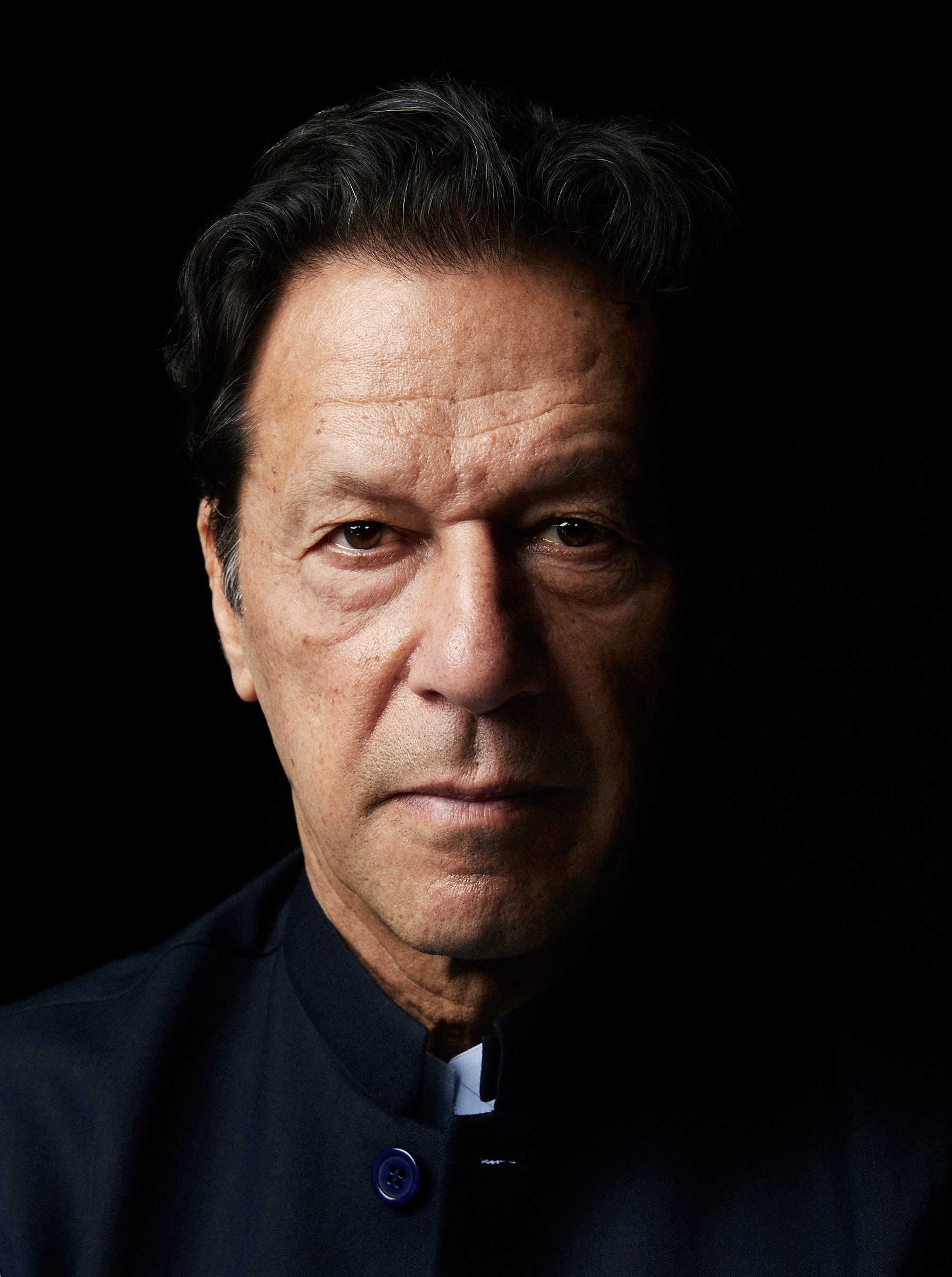
But if Khan recognized the problem, he did little to solve it. After his election in 2018, he was in an uncommonly strong position with the backing of the military and progressives, as well as the tolerance of the Islamists. Now, with all the bad blood and open warfare among these factions, even if he claws his way back, “he’ll be in a weaker position to actually effect any reforms,” says Munter, the former U.S. ambassador, “if he had any reforms to begin with.”
When asked for his step-by-step plan to get Pakistan back on track, Khan is light on details. After elections, he says that a “completely new social contract” is required to enshrine power in political institutions, rather than the military. If the army chief “didn’t think corruption was that big a deal, then nothing happened,” Khan complains. “I was helpless.” But the path to this utopia remains murky. Asked how he plans to turn his much trumpeted Islamic Welfare State ideal into a reality, Khan talks about Medina under the Prophet and the social conscience of Northern Europeans. “Scandinavia is probably far closer to the Islamic ideal than any of the Muslim countries.”
But the military looms large in Pakistan partly because national security is a perennial issue. Many assumed that the newly returned Taliban would stamp out all cross-border attacks from Afghanistan. But Pakistan recorded the second largest increase in terrorism-related deaths worldwide in 2022, up 120% year-over-year. “It was Khan who was pushing for talks with [the Taliban] at all costs,” says Kugelman, of the Woodrow Wilson Center. “That embrace is now experiencing significant levels of blowback.”
Read More: Pakistan’s Generals Want To Muzzle Imran Khan. It May Backfire
That Pakistan is moving away from the U.S. and closer to Russia and China is a moot point; the bigger question is who actually wins from embracing Pakistan. The $65 billion China-Pakistan Economic Corridor was supposed to be the crown jewel in President Xi Jinping’s signature Belt and Road Initiative, linking China via roads, rail and pipeline to the Arabian Sea. But Gwadar Port is rusting and suicide bombers are taking aim at buses filled with Chinese workers. Loans are more regularly defaulted than paid. Today, even Iran looks like a more stable partner.
Ultimately, competition with Beijing defines American foreign policy today, meaning Washington prioritizes relations with Pakistan’s archnemesis India, which is a key partner in the Biden Administration’s Indo-Pacific Strategy to contain China. Toward that imperative, the White House turns a blind eye even to New Delhi’s continued close relationship with Putin. The U.S. kinship with India may mean Pakistan was always destined to move closer to China. But after the U.S. pulled out of Afghanistan, Pakistan is not the strategic lynchpin it once claimed to be—and memories are hardly fond; Pakistan secretly invested heavily in the Taliban. “Lots of Americans in Washington say we lost the war in Afghanistan because the Pakistanis stabbed us in the back,” says Munter.
What happens next? Many in Khan’s PTI suspect the current government may declare their party a terrorist organization or otherwise ban it from politics. Others believe that Pakistan’s escalating economic, political, and security turmoil may be used as grounds to postpone October’s general election. Ultimately, all sides are using the tools at their disposal to prevent their own demise: Khan wields popular protest and the banner of democracy; the government has the courts and security apparatus. Caught between the two, the people flounder. “There are no heroes here,” says Kugelman. “The entire political class and the military are to blame for the very troubled state the country finds itself in now.”
It’s a crisis that Khan still claims can be solved by elections, despite his broken relationship with the military. “The same people who tried to kill me are still sitting in power,” he says. “And they are petrified that if I got back [in] they would be held accountable. So they’re more dangerous.”
—With reporting by Hasan Ali/Islamabad
More Must-Reads From TIME
- The 100 Most Influential People of 2024
- Coco Gauff Is Playing for Herself Now
- Scenes From Pro-Palestinian Encampments Across U.S. Universities
- 6 Compliments That Land Every Time
- If You're Dating Right Now , You're Brave: Column
- The AI That Could Heal a Divided Internet
- Fallout Is a Brilliant Model for the Future of Video Game Adaptations
- Want Weekly Recs on What to Watch, Read, and More? Sign Up for Worth Your Time
Write to Charlie Campbell at charlie.campbell@time.com
